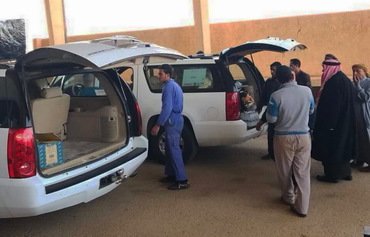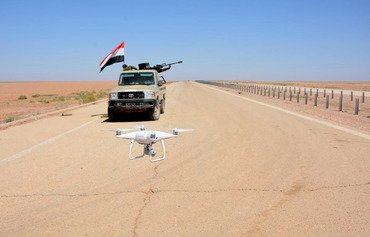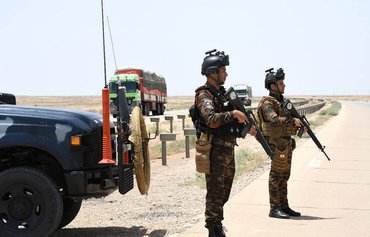The Iraqi Ministry of Transportation has reopened the international highway that stretches between Baghdad and Amman through the Trebil crossing to passenger traffic.
The highway and crossing into Jordan had been closed to passenger traffic since the "Islamic State of Iraq and Syria" (ISIS) overran the area, but reopened on a limited basis at the end of August.
The highway, which stretches from Baghdad to the Trebil crossing through Fallujah, Ramadi and Anbar's western desert to the town of al-Rutbah, was considered one of the most dangerous stretches of road in the country.
It was dubbed "the highway of death" after a spate of kidnappings, assassinations, robberies and torching of vehicles occurred along the route.
![Iraqi forces deploy along the international highway leading to the Trebil crossing with Jordan, previously known as the 'highway of death'. [Photo courtesy of the Military Media Cell]](/cnmi_di/images/2018/01/05/10934-trabil-iraq-open-600_384.jpg)
Iraqi forces deploy along the international highway leading to the Trebil crossing with Jordan, previously known as the 'highway of death'. [Photo courtesy of the Military Media Cell]
ISIS released several videos of acts of terrorism its fighters committed along the route, showing its elements pulling passengers from vehicles and killing them.
The most notorious of these showed the group’s former leader Shakir Wheib killing three Syrian truck drivers along the international highway.
The Ministry of Transportation announced the reopening of that stretch of highway to underscore the success of the Iraqi forces in securing the area and taking control of the entire 570-kilometre road.
The ministry's General Company for Transport of Passengers and Delegations resumed its journeys to Amman via Trebil on December 21st, as part of a plan to improve international transportation and connect Iraq with its neighbours.
The first journey was a success, as new vehicles transported passengers to and from the two destinations, ministry spokesman Salim Moussa told Diyaruna.
"Transportation will continue on this line according to market demand rather than a fixed and regular schedule of operations," he said.
The ministry has ensured all administrative and legal measures are in place to transport passengers, including an easier visa process, while security forces have done their part to collaboratively secure the highway, Moussa added.
Opening additional roads
In addition to reopening the Baghdad-Trebil highway, another road that had been closed for three years due to terrorist activity has been reopened between the cities of Haditha in Anbar and Baiji in Salaheddine.
This route links central Iraq with the northern part of the country.
The 150-kilometre road runs through the desert from northern Anbar and south-western Salaheddine, passing by al-Tharthar Lake, an area ISIS once used as a key training camp for its fighters.
The road is considered to be one of the most important highways in the province, Anbar provincial council member Naeem al-Koud told Diyaruna.
"It could serve as a strategic access route for trade and for the transportation of goods from the north to the central part of the country via Anbar," he said.
Due to Anbar’s large expanse of open land, most highways in the province were not safe even before ISIS arrived on the scene, he said, with regularly occurring highway robberies, kidnappings and terrorist activity.
"With the reopening of most of these roads, additional security forces are needed so passengers can feel safe around the clock," he said.
Resuming transportation by land in Anbar is not limited to security, which has been achieved to a large extent, he said, as there is also the need to rebuild the 120 bridges that were destroyed by ISIS.
Road construction also should be a priority, he added, as damage has occurred due to movement of military vehicles.
Efforts to secure desert areas
In addition to securing the highway to Trebil, Iraqi forces have managed to penetrate deep into the surrounding desert and stabilise the area, security expert Safa al-Assam told Diyaruna.
This has brought an end to the perilous security situation that travelers faced on remote stretches of road running through the Anbar desert, he said.
Days before passenger transport to Trebil resumed, Iraqi security and tribal mobilisation forces conducted a 10-day operation, penetrating deep into the desert, and seized control of remaining ISIS strongholds.
"Remote desert areas in Anbar and other Iraqi provinces are no longer a source of concern for Iraqi forces, particularly in light of Iraqi and coalition efforts to protect the region's skies," he said.
Military operations and aerial bombardment have wiped out all ISIS bases, strongholds, weapons storage facilities and field medical centres, he said, with only small cells of five to eight individuals remaining.
"These do not pose a serious threat to the security of the region," he said.
Meanwhile, the Iraqi army is intensifying its efforts to locate and destroy secret networks of tunnels dug by ISIS in desert areas close to cities, villages and main roads.

![The Iraqi Ministry of Transportation has authorised a new fleet of vehicles to transport passengers to the Trebil border crossing with Jordan. [Photo courtesy of the Ministry of Transportation]](/cnmi_di/images/2018/01/05/10933-transportation-trabil-iraq-600_384.jpg)






